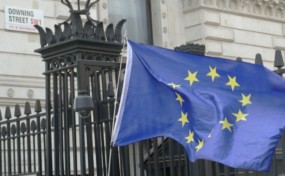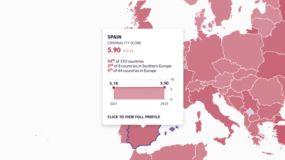Posted on 10 Aug 2020
New regulations adopted by the UK government will make it easier to sanction individuals and groups involved in human-rights violations and transnational organized crime. But the limited punitive arsenal means that the regulations may work best as a deterrent for financial service providers from engaging with criminal syndicates. Crucially, the regime will allow civil society to engage in the sanctions-designation process.
On 6 July 2020, the Global Human Rights Sanctions Regulations 2020 (‘the regulations’) came into force in the United Kingdom. The new regulations are the UK’s equivalent of the US Global Magnitsky Act, a foreign-policy tool aimed at deterring human-rights violations around the globe and establishing accountability for those involved in such violations.
The first round of sanctions was announced by British Foreign Secretary Dominic Raab on the same day, targeting 47 individuals, including members of a Russian criminal syndicate accused of murdering Sergei Magnitsky (who blew the whistle on a US$230 million tax fraud); Saudi operatives connected to the 2018 assassination of journalist Jamal Khashoggi in Turkey; two high-ranking Myanmar generals accused of ethnic cleansing; and two North Korean organisations connected to the regime’s forced-labour camps. Introducing the new sanctions regime in Parliament, Raab stressed that ‘these sanctions are a forensic tool, they allow us to target perpetrators without punishing the wider people of a country affected’.
The new regulations empower the foreign secretary to freeze the assets of and restrict UK entry to any legal person (including groups, businesses and organisations) ‘involved in’ violations of the right to life, the prohibition on torture or cruel, inhuman or degrading treatment, or the right to be free from slavery, servitude and forced labour. ‘Involved persons’ include direct perpetrators, facilitators and inciters; persons who conceal evidence of violations; persons who knowingly provide financial and technical services or resources to direct perpetrators, or in any way that contributes to such violations; persons who profit (financially or otherwise) from such violations; and investigators or prosecutors who intentionally or recklessly fail in their duty to pursue the perpetrators. Sanctions may also be imposed on individuals and entities that are owned or controlled (directly or indirectly) by those involved in violations, their members and associates, and those acting on their behalf.
The regulations could become a powerful tool for combating transnational organized crime. The explicit naming of slavery, servitude and forced labour in the list of qualifying human-rights violations indicates that the government is willing to use sanctions to target human-trafficking networks. Moreover, a Foreign and Commonwealth Office policy paper, which listed combating modern slavery and preventing sexual violence in or around conflict as top priorities, noted that the government ‘is likely to give particular attention to non-state actors who have acquired a significant degree of control, authority and organisation over people or an area’.
In a marked shift away from the traditional conceptualisation of human rights as a check on the power of the state, there is no requirement for qualifying violations to be perpetrated by or on behalf of a state, allowing the government to target criminal syndicates, terrorist groups and businesspersons with no connection to public authorities. In this, the UK is following an evolving global trend towards targeting non-state actors, as exemplified by the UN, US and European Union sanctions against human traffickers in Libya.
The regulations also create criminal liability for persons who deal with (or make available) funds and economic resources owned, held or controlled by a sanctioned person, meaning that UK-based businesses and legal and financial services are required to conduct robust due diligence to ensure that they have no direct or indirect dealings with designated persons. Failure to do so may result in up to seven years’ imprisonment or a fine. This will allow the UK government to target and punish financial vehicles used by transnational syndicates to move assets and launder illicit gains, maiming a crucial arm of the syndicates’ operations.
The key advantage of sanctions over criminal prosecutions in this area is that sanctions are much easier to effect. Criminal cases targeting transnational crimes are notoriously complex, require a high evidential burden (beyond reasonable doubt), are time-consuming and tremendously costly. By contrast, sanctions require a much lower burden of proof, can be imposed at a fraction of the cost and are much quicker to implement: assets can be frozen within hours of an alleged human-rights violation. Crucially, the UK foreign secretary may make a designation covertly – meaning that assets can be frozen prior to informing those targeted – to prevent capital flight. However, unlike criminal prosecutions, the punitive arsenal of sanctions is limited to asset freezes and immigration bans. Sanctions are unlikely to replace criminal prosecutions, and should be seen as a way of weakening and deterring powerful transnational syndicates.
There are other important limitations to the new regulations. First and foremost, the decision on whether (and whom) to sanction is very much at the discretion of the foreign secretary. And while the legislation provides for a myriad of ‘purposes’, the overriding aim of this tool is to further UK interests and post-Brexit foreign-policy objectives: it is fundamentally a decision underpinned as much in political calculus as human-rights accountability. It remains to be seen whether the government will apply punitive sanctions against ‘friends and allies’, even in the face of convincing evidence of human-rights violations. Secondly, the list of qualifying human-rights violations is very restrictive: the rights to liberty, fair-trial rights, property rights and the freedoms of expression, assembly and religion are conspicuous by their absence. Finally, unlike its US counterpart, the UK regulations do not seek to punish corruption – a key driver and enabler of human-rights abuses.
Civil society has a key role to play in helping identify potential targets for sanctioning. Any individual, organisation or state may present evidence of human-rights violations to the foreign secretary with a request to designate specific persons or entities. The potential for civil society to effect change through sanctions will depend on its ability to collect credible and reliable evidence of human-rights violations and convince the foreign secretary to take action in specific cases. Nevertheless, aside from mobilising public opinion, civil society has few means of challenging a government that refuses to act on its recommendations.
Ultimately, the regulations represent an opportunity for non-governmental organisations, victims’ representatives and other interested parties to support the UK government in targeting sophisticated criminal networks, their funding or money-laundering streams and the corrupt officials who shelter them. This is not a substitute for criminal prosecutions, but a useful tool to undermine the power of criminal syndicates and deter serious human-rights abuses. The biggest impact may well prove to be an incentive for UK-based financial services to conduct thorough due diligence so as to avoid enabling human rights abusers and organized crime. It is hoped that the government will not shy away from making use of this powerful new tool in an objective and effective manner.



